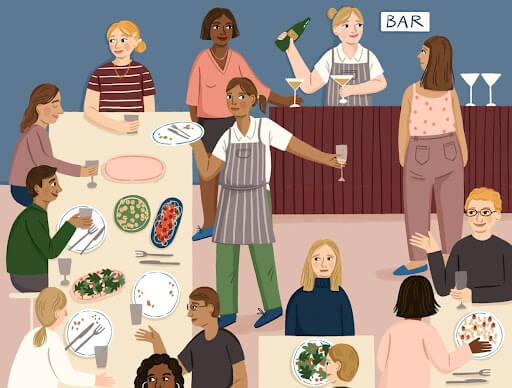It’s clearer now, perhaps more than ever, that traditional organizational training is ineffective. The traditional training approach is – write a book, start a training company, build learning that believes the model is the answer, and then require participants to sit, listen and absorb the trainer’s wisdom. This approach does not lend itself to effective learning. In fact, it does a disservice to the experience and skills learners bring to the table.
One way to think about our approach to learning and facilitation is through the power of metaphor. Metaphors can accelerate understanding and according to
Mind Tools, can change the way we think of a concept on an almost subliminal level. At JMReid Group, we’re big fans of food, and we believe that the restaurant experience offers a rich metaphor for our work.
Organizational Training to Whet the Appetite
Imagine for a moment, a bustling restaurant with servers balancing trays full of tonight’s menu offerings and weaving between guests. The host seats you at the best table in the house and soon you’re sipping a robust red wine and hearing about tonight’s specials. You’re excited because this place has been getting a lot of hype and you’re expecting to be impressed. You are also a little bit of an amateur chef yourself. The table is set, your food arrives, but to your dismay… the meal is less than extraordinary.
Serving bad meals wastes the diner’s time and money. But where exactly did things go wrong? Were the specials not agreed upon by the leadership team before being implemented by the chef? How much forethought was given to the diner themselves in considering their background, their tastes, and their expectations? How fresh are the ingredients, and does the menu differentiate the diner’s experience, or is it basically the same as the place across the street?
Every now and then a meal of high carbs and sugar might suffice, but think about Morgan Spurlock’s food experiment in the 2004 documentary Super-Size Me. After 30 days of nothing but fast food, Spurlock suffered severe health issues. Healthy patrons require more than fatty, nutrient-deficient meals.
What does this have to do with
JMReid Group? When it comes to a fruitful, effective learning experience,
context is king. Just as some restaurants care about replicating an experience, think McDonald’s or Burger King, many organizational training companies have the same goal. The design is created once and churned out for all types of companies and learners. The menu is the same, the recipes are the same, and the learning is well… consistent. Or should we say passable?
Effective Learning Needs Context
We think about effective learning from soup to nuts — we curate from the latest thinking, research, and neuroscience. Then, we apply them in a manner that will suit the learner, and therefore the client, best. Think of us as a farm-to-table restaurant, carefully picking fresh ingredients and making meals not based on an old recipe, but one that addresses the issues learners face today, within their context.
Context means
customization. What if you went out to eat expecting to order something from the menu based on your tastes and preferences only to find out everyone is getting the same exact meal? What is useful and valuable (and tasty!) to one may not be right for someone else. The difference is comparable to eating at a fast-food restaurant versus the bistro down the street serving locally sourced ingredients. At JMReid Group, we understand the value of making learning personal. Learning that fits the learner’s real world is a far more nourishing and enjoyable meal.
To ensure our training is nourishing, we have a
discovery process that allows us to tailor our learning content specifically to the learner’s context. Understanding and appreciating the context in any given situation helps approach that situation with clarity and perception. A hamburger can be more than just lettuce and tomato, ketchup and mustard. Have you ever had a burger with aioli and an over-easy egg? How about adding thinly cut onion rings to a bison burger? We know that generalization isn’t an effective way of facilitating effective learning and long-term results.
Off-the-shelf organizational training is an approach with an expired “best by” date. People can tell the difference between an authentic experience and a repetitive, routine one. Just as a bad meal can doom a dining experience, badly designed training can ruin a learning experience and spell disaster for leadership and teams at all levels.
In the interest of your learners, give us a call.
